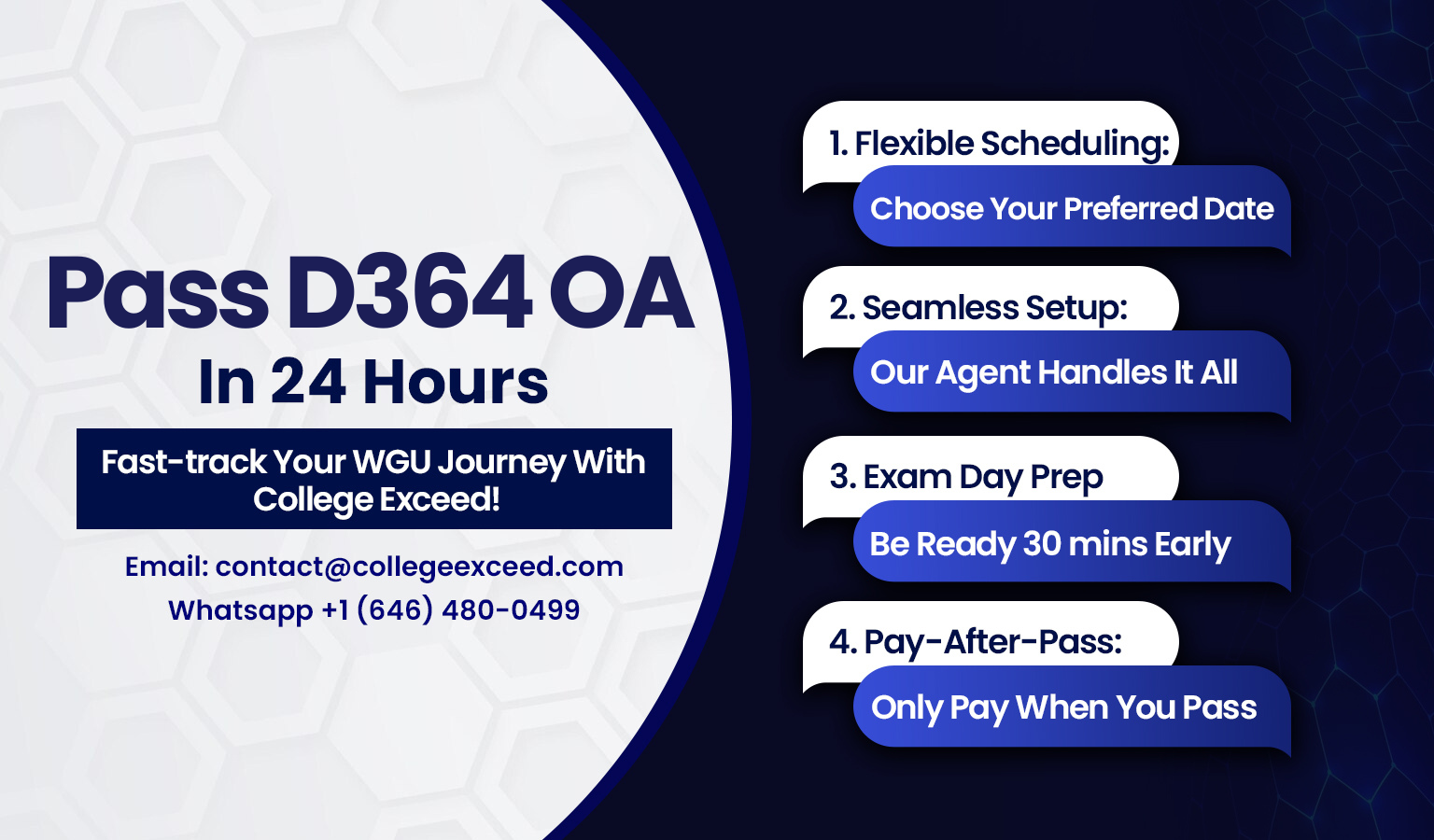Struggling to unravel the mysteries of “Financial Management I WGU D364”? No worries, we’ve got your back. This article is your one-stop guide to navigating this course like a pro. Whether you’re just starting out or gearing up for the big Objective Assessment (OA), we’re here to demystify what this module offers,
In this article we will discuss below topics;
Imagine having a roadmap that not only shows you the key topics of the course but also provides practical tips on how to prepare effectively. That’s exactly what we’re offering. From comprehensive study guides designed to help you ace the OA to a curated list of external resources that will broaden your understanding, this blog post covers it all. We know that the journey to mastering Financial Management I can be challenging, but with the right tools and strategies, you’ll be able to tackle it head-on.
Ready to sharpen that mind, boost your analytical skills, and ace D364 with flying colors? Let’s dive right in and make this journey a successful one!
...
What is Module WGU D364📖
Welcome to Financial Management I (D364), a pivotal course designed to enhance your understanding of how managers efficiently utilize working capital to ensure the smooth day-to-day functioning of a company. This module is essential for grasping the fundamentals of financial management, focusing on the sources and uses of working capital. We delve into current assets such as cash, accounts receivable, and inventory, as well as current liabilities like accounts payable and salaries. These concepts are crucial for meeting daily obligations and maintaining the financial health of an organization.
Over the course of the work, you will calculate the common working capital ratios, such as the current ratio, quick ratio, and the receivables turnover ratio. These metrics are very helpful to the managers as they give an insight into how well an organization is managing its capital. Also, you will work on a cash budget which would be quite helpful and valuable experience not only for this particular course but also for the capstone course. It will provide you with the practical aspect of knowledge, which is essential in the corporate finance and the personal finance streams.
In the latter part of the course, we will explore cash management strategies and the optimization of investment portfolio performance. You will study strategies to convert accounts receivable and inventory into cash swiftly, understanding the conversion cycle and its importance. Furthermore, the course covers the use of financial instruments to optimize investment portfolios, providing you with a comprehensive toolkit to manage and enhance financial performance effectively. By the end of this module, you will be well-prepared to apply these principles in real-world scenarios, ensuring your success in both academic and professional settings.
By completing this module, you will acquire the below competencies. (The weightage of each competency on the OA is mentioned as a percentage)
- Analyze sources and uses of enterprise working capital (60%)
2. Apply cash management strategies in an enterprise (20%) - Optimize investment portfolio performance (20%)
WGU D364 Study Guide to Navigate the Module📝
In this section, we will discuss the tried and true study method that I have used to successfully complete my OA. This method will ensure that you are well-prepared for the challenge ahead and will also take you to your goal in the shortest amount of time. This is a newly introduced course to the WGU catalog so you will only have a limited amount of study resources and advice to guide you. But don’t worry, I will reveal all the secrets you need to know to pass D364. So be sure to closely follow the steps that I will reveal in this article, and I will guarantee your success in passing the OA. Without further ado, let us begin…
Step 1 – Watch the Welcome video and contact your Course Instructor
Before diving deep into the course content of module D364, let us first take a step back and prepare ourselves for the journey ahead. If you are new to this module and heading into it blindly, you will not be able to achieve the maximum outcome from your studies. So as our first step in this study guide, let us understand the scope and overview of the course structure and the content. Follow the instructions given below to find the Welcome Video of module D364 and go through it to understand what the module has to offer.
- Log onto the Student Portal of WGU > Go to the module Financial Management I WGU D364 > Go to “Course Search” > Locate the link “Welcome to D364 – Financial Management I” > Click on the link “D364 Financial Management I Welcome Video”
Once you go through the Welcome Video and prepare yourself for the study journey, let us now gather the tools and resources to assist us study the course content. As mentioned above, this is a new course introduced to the WGU catalog, so you will not be able to find many resources or advice on the module course search or the course chatter. The study resources are still in development by the course instructors so they are the only ones who can distribute them. Write up an email or contact your course instructor as you prefer to request the available study material to help you in your studies. And utilize them to help you achieve the best in your study journey.
Step 2 – Read the Textbook
The only resource provided by WGU to study the module is the Textbook of D364. So we will be utilizing this study resource primarily to equip ourselves with the knowledge to pass the OA of this module. The Textbook is well written to share the knowledge of Financial Management I but it can be a very lengthy read. But do not get discouraged as reading the Textbook from the beginning to the end is mandatory to grasp the full knowledge of the module. The course content will comprise both theories and mathematical functions and equations you will need to calculate. So be prepared to showcase your math skills in this module as well. When you come into the second and third sections, you will also come across many supplemental videos that will help you better understand the core concepts as well. Each section will end with section-end quizzes to help you evaluate your knowledge of each concept you have learned. So utilize them to find the gaps in your knowledge and eliminate them before moving on to the next. Overall, the Textbook is well constructed to provide you with all the tools you need to understand and grasp the knowledge of Financial Management I. To find the Textbook, follow the below-given instructions.
- Log onto the Student Portal of WGU > Go to the module Financial Management I WGU D364 > Click on “Go to course materials”
While you go through the Textbook, make sure to take down short notes and make your own flashcards to help you commit the knowledge to your memory.
Step 3 – Prepare for the assessments
Once you read through the Textbook, let us go through some practice questions to hone your knowledge of the core concepts and the equations of D364. You will be able to locate a recorded video of a Q&A session by navigating to the location.
- Log onto t belowhe Student Portal of WGU > Go to the module Financial Management I WGU D364 > Go to “Course Search” > Locate the link “Welcome to D364 – Financial Management I” > Click on the link “D364: Live Session Recording /**Prepare for the OA practice Q&A”
Watch this video and attempt each question yourself before going through the answers.
Step 4 – Utilize the Pre-A
The Pre-A will be our main tool to evaluate our overall knowledge of module D364. The Pre-A is basically a mock assessment that is made to mimic the real OA to help us understand our exam readiness as well as our understanding of each topic of the module. So once you are fully prepared and competent with your knowledge, attempt the Pre-A and go through it as you would go through a real exam.
Once you complete the Pre-A, you will be presented with a coaching guide that will be auto-generated based on your performance, This coaching guide will showcase you’re the scores you achieved in the Pre-A by dividing the score by each competency. By reading the coaching guide, you will be able to get a clear picture of your strengths and weaknesses. This will give you an opportunity to go back and revise the material you are not competent with and strengthen your knowledge.
By using the short notes you have taken and the Textbook of the module, revise your knowledge and attempt the Pre-A once again to achieve a better score than your previous attempt. Follow this method until you are able to receive a score of more than 85% on the Pre-A before moving on to the final step.
Step 5 – Face the OA
You are now equipped with all the knowledge you require to pass the OA with flying colors. So let us do our final preparations and face the final challenge of D364 to ace this module.
To prepare yourself for the challenge, I recommend that you go through your short notes once again to refresh your knowledge of the core concepts. Also, make sure to read the “Strategies to pass the OA” section of this article to better understand what you are about to face and how to prepare for it.
Once you are ready, follow the below steps to make sure you are prepared for the OA.
- Test your internet connection and make sure it is stable.
- Test your webcam and microphone to verify they are in working condition
- Make sure you are in a disturbance-free environment
- Read through the guidelines and rules of the assessment
- Be confident in your skills and make sure you are fully prepared for the OA
And finally, without hesitation, schedule the OA and give it your best to ace it on your first attempt.
...
Strategies to Use in Your OA👨🏻🏫
To excel in the OA (Objective Assessment) for Financial Management I (D364), it is crucial to be well-prepared and understand the nuances of the exam content. Here are some effective strategies to help you pass:
- Align Your Study with the PA: The OA aligns well with the Performance Assessment (PA), but it delves deeper into specific scenarios. Ensure you thoroughly understand the PA content and are prepared to apply your knowledge to more detailed questions.
- Read the Questions Carefully: Pay close attention to each question to avoid misunderstandings. Many questions will require you to distinguish between assets/liabilities and income/expense. Remember that assets and liabilities relate to equity and solvency, while income and expenses relate to cash flows and profitability. For instance, if asked about management strategies for profitability, focus on answers that involve sales or costs rather than equipment or debt.
- Master Key Financial Topics: Be well-versed in critical concepts such as the Cash Conversion Cycle (CCC) and its components, including Days Payable. Understand Net Working Capital (NWC), Net Operating Working Capital (NOWC), bad debts, Additional Funds Needed (AFN), Days Sales Outstanding (DSO), Return on Equity (ROE) in relation to inventory turnover, cash budgets, and zero balance accounts. A solid grasp of derivatives is also essential.
- Know Your Formulas: Familiarize yourself with essential financial formulas, including those for NWC, NOWC, CCC, ROE, Average Turnover Ratio (ATR), and Current Ratio. Many questions will involve the CCC, so ensure you understand how different components influence changes in the CCC through basic algebra.
- Practice Cash Flow Calculations: Develop proficiency in determining cash balances based on inflows and outflows, especially for credit sales, supplier purchases, and bad debts. These questions can be time-consuming due to the math involved, so it’s wise to tackle them last during the exam to manage your time effectively.
By adhering to these strategies and thoroughly preparing, you’ll be well-equipped to tackle the OA and achieve a successful outcome. Remember, stay focused, and don’t get discouraged. You’ve got this!
...
...
FAQ❓
Q: What is the main focus of Financial Management I WGU D364?
A: The main focus of Financial Management I WGU D364 is on how managers efficiently utilize working capital to meet the daily operational needs of a company. This includes understanding current assets, current liabilities, and key financial ratios.
Q: What are the prerequisites for this course?
A: The prerequisites for Financial Management I include Principles of Financial and Management Accounting, Finance, Tools for Managers, Personal Finance, and Corporate Finance.
Q: What can students expect from the course content?
A: Students can expect to learn about managing current assets like cash, accounts receivable, and inventory, as well as current liabilities such as accounts payable and salaries. The course also covers working capital ratios and cash management strategies, providing practical knowledge applicable to both corporate and personal finance.
Q: How important is it to understand cash flow calculations for the OA?
A: Understanding cash flow calculations is crucial, especially for credit sales, supplier purchases, and bad debts. These questions can be time-consuming, so it’s recommended to save them for last during the exam.
...
Conclusion 📄
As you embark on your journey through Financial Management I (D364) at WGU, we encourage you to take the advice provided in this article to heart. By refining your study approach based on these tips and utilizing the comprehensive study guide, you’ll be well-prepared to tackle the Objective Assessment with confidence. Focus on mastering the key topics we’ve highlighted, including the Cash Conversion Cycle, working capital ratios, and cash management strategies. These core concepts will not only help you excel in the course but also equip you with practical knowledge for your future career in finance. Remember to stay encouraged and persistent in your studies. With dedication and the right strategies, passing the OA is within your reach. Best of luck on your path to success in Financial Management I!






